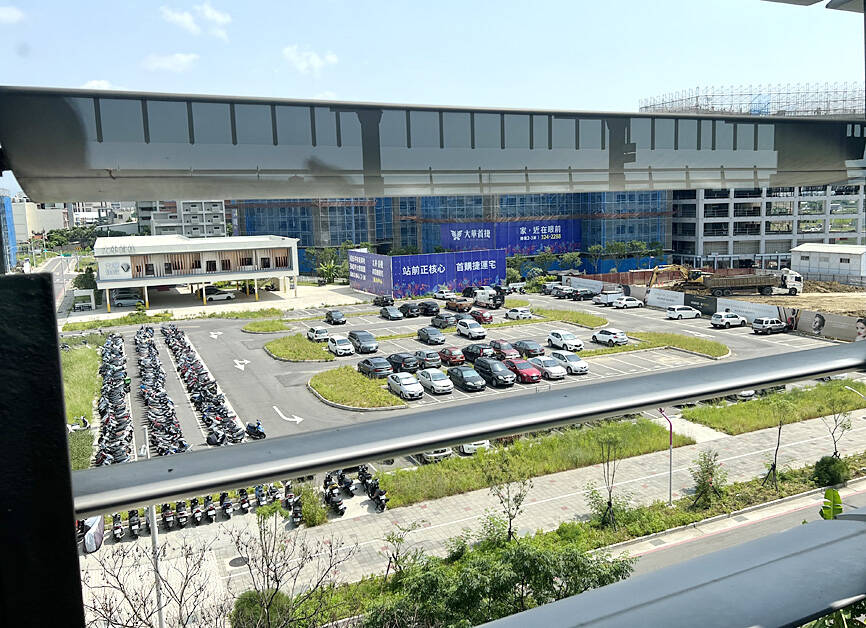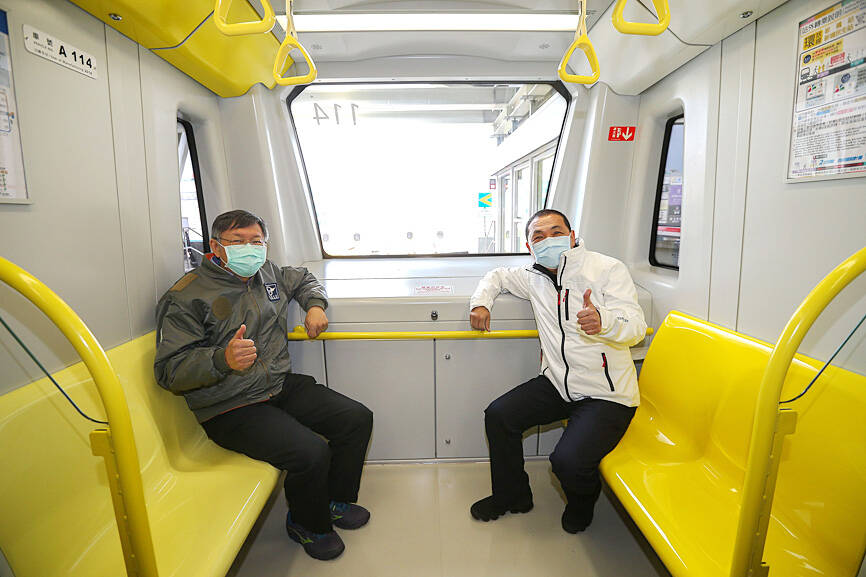The Executive Yuan has proposed spending NT$210.2 billion (US$6.96 billion) over the next two years of the fourth phase of the Forward-looking Infrastructure Development Program, primarily focusing on metropolitan public transportation systems.
The phase four project plans, which have yet to be submitted to lawmakers, would propose spending NT$104.4 billion next year and NT$105.8 billion in 2024, the Executive Yuan said.
They include 27 initiatives for trains, high-speed rail and MRT systems, which would be collectively allotted NT$53.8 billion; NT$4.4 billion for urban and rural development; NT$45.1 billion for water infrastructure; and NT$38.2 billion for digital infrastructure.

Photo provided by Taoyuan Department of Rapid Transit System
The projects also include NT$1.4 billion for childcare facilities in a bid to increase the birthrate, NT$1.4 billion for efforts to improve food safety standards and NT$10.2 billion for professional educational training, along with measures aimed at boosting employment.
The biggest spending item for the rail-related projects is a NT$6.9 billion plan to extend the Taoyuan Airport MRT and develop the areas along that transit line, the Executive Yuan said.
The plans include NT$5.5 billion to electrify the double-track railway running from Hualien to Taitung, and NT$5.26 billion to build a subway system in Tainan.

Photo: CNA
The proposals also include NT$6.2 billion to build underground rail in Taoyuan, and NT$5.89 billion to incorporate digital technology into the Taiwan Railways Administration (TRA) network.
These projects aim to integrate local trains and the high-speed rail into a seamless public transit system while upgrading TRA systems and improving the quality of its services in the country’s eastern region.
The Special Act on the Forward-looking Infrastructure Development Program (前瞻基礎建設特別條例) was passed by the Legislative Yuan in July 2017 to allow the Cabinet to spend up to NT$840 billion on national infrastructure over eight years.
Phase four projects are funded exclusively through public financing, DGBAS Minister Chu Tzer-ming (朱澤民) said on Friday, adding that NT$70 billion remains from the development program.
Separately, the Ministry of Digital Affairs said its budget for next year is NT$5.7 billion, while another NT$16 billion would be allotted from the infrastructure development program for the ministry to contribute to other government entities.
The funds from the forward-looking program are to cover efforts to upgrade government services, implement infrastructure projects, upgrade industry with digital technology, cultivate talent, close the urban-rural digital gap and help non-profit organizations take advantage of information technology, it said.
The Executive Yuan’s general budget proposal was also finalized on Thursday, in which the Ministry of Culture’s proposed budget for next year is NT$21.22 billion, an increase of 20 percent over this year’s NT$17.76 billion.
The boost to the culture ministry’s budget would be further augmented by the infrastructure program’s funding of NT$2.55 billion next year and NT$2.97 billion in 2024, the ministry said.
The money would be used to promote national languages and traditional arts, preserve cultural heritage, and fund the maintenance and construction of museums, the ministry said.
Its planned public works include improvements to the National Human Rights Museum and Sun Yat-sen Memorial Hall, and building a National Children’s Future Plaza, it added.
Additional reporting by Ling Mei-hsueh and CNA

INVESTIGATION: The case is the latest instance of a DPP figure being implicated in an espionage network accused of allegedly leaking information to Chinese intelligence Democratic Progressive Party (DPP) member Ho Jen-chieh (何仁傑) was detained and held incommunicado yesterday on suspicion of spying for China during his tenure as assistant to then-minister of foreign affairs Joseph Wu (吳釗燮). The Taipei District Prosecutors’ Office said Ho was implicated during its investigation into alleged spying activities by former Presidential Office consultant Wu Shang-yu (吳尚雨). Prosecutors said there is reason to believe Ho breached the National Security Act (國家安全法) by leaking classified Ministry of Foreign Affairs information to Chinese intelligence. Following interrogation, prosecutors petitioned the Taipei District Court to detain Ho, citing concerns over potential collusion or tampering of evidence. The

‘FORM OF PROTEST’: The German Institute Taipei said it was ‘shocked’ to see Nazi symbolism used in connection with political aims as it condemned the incident Sung Chien-liang (宋建樑), who led efforts to recall Democratic Progressive Party (DPP) Legislator Lee Kun-cheng (李坤城), was released on bail of NT$80,000 yesterday amid an outcry over a Nazi armband he wore to questioning the night before. Sung arrived at the New Taipei City District Prosecutors’ Office for questioning in a recall petition forgery case on Tuesday night wearing a red armband bearing a swastika, carrying a copy of Adolf Hitler’s Mein Kampf and giving a Nazi salute. Sung left the building at 1:15am without the armband and apparently covering the book with a coat. This is a serious international scandal and Chinese

Seventy percent of middle and elementary schools now conduct English classes entirely in English, the Ministry of Education said, as it encourages schools nationwide to adopt this practice Minister of Education (MOE) Cheng Ying-yao (鄭英耀) is scheduled to present a report on the government’s bilingual education policy to the Legislative Yuan’s Education and Culture Committee today. The report would outline strategies aimed at expanding access to education, reducing regional disparities and improving talent cultivation. Implementation of bilingual education policies has varied across local governments, occasionally drawing public criticism. For example, some schools have required teachers of non-English subjects to pass English proficiency

TRADE: The premier pledged safeguards on ‘Made in Taiwan’ labeling, anti-dumping measures and stricter export controls to strengthen its position in trade talks Products labeled “made in Taiwan” must be genuinely made in Taiwan, Premier Cho Jung-tai (卓榮泰) said yesterday, vowing to enforce strict safeguards against “origin laundering” and initiate anti-dumping investigations to prevent China dumping its products in Taiwan. Cho made the remarks in a discussion session with representatives from industries in Kaohsiung. In response to the US government’s recent announcement of “reciprocal” tariffs on its trading partners, President William Lai (賴清德) and Cho last week began a series of consultations with industry leaders nationwide to gather feedback and address concerns. Taiwanese and US officials held a videoconference on Friday evening to discuss the